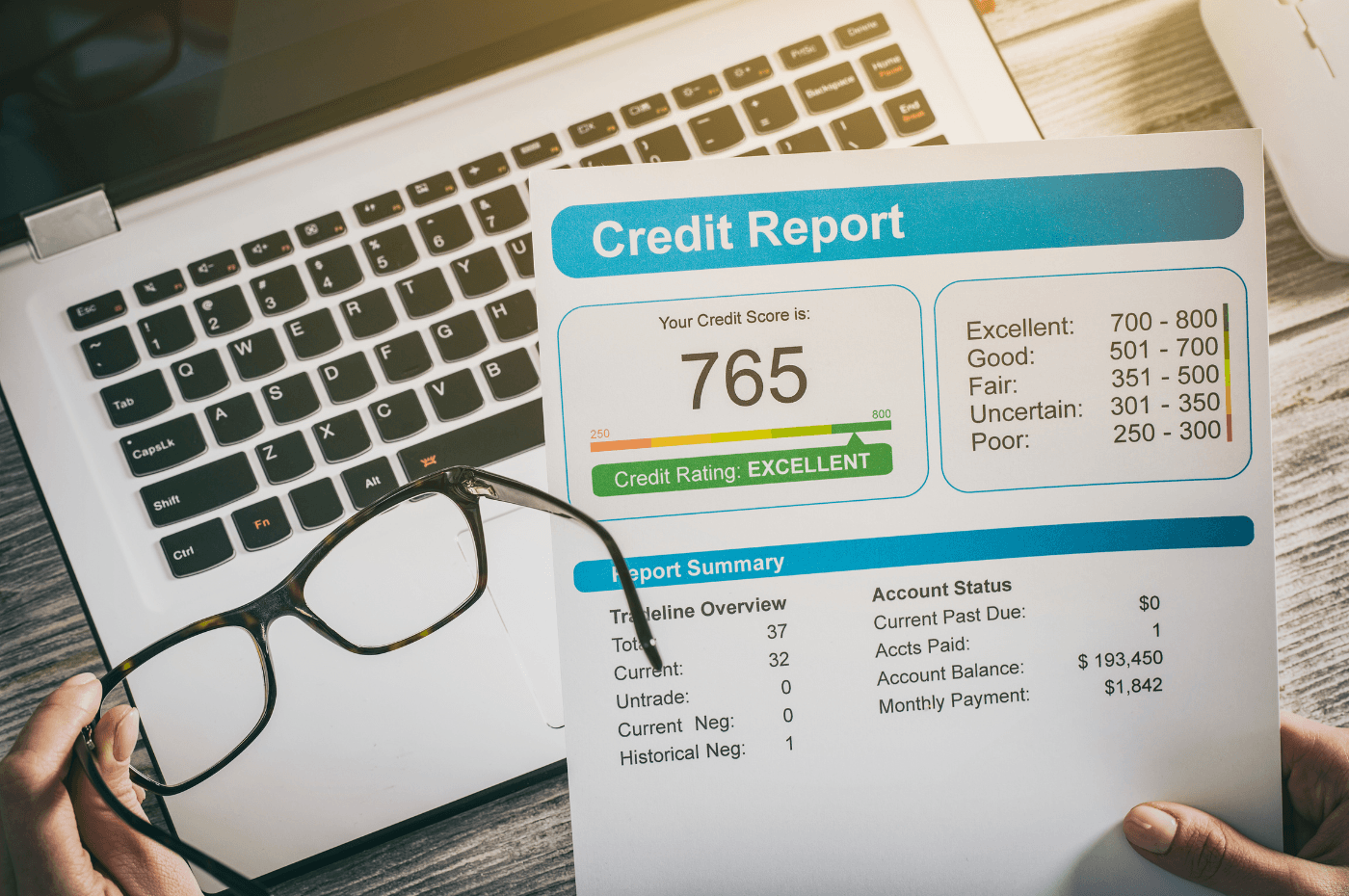Maintaining a strong credit rating is essential when seeking a mortgage or any financing. Indeed, a higher credit score improves your ability to negotiate with lenders, allowing you to secure advantageous terms such as lower interest rates.
Here is an extensive article covering all you need to know about your credit rating before applying for a mortgage loan.
What is the purpose of credit reports?
Credit reports are essential for summarizing your financial status. Lenders use these reports to evaluate your repayment history, current debts, and overall creditworthiness when considering your mortgage application.
In Canada, Equifax and TransUnion oversee credit reports by collecting data from lenders to generate credit scores. These scores act as indicators of your trustworthiness as a borrower.

Building a good credit history: it takes time
Building a strong credit history before venturing into real estate investment requires cultivating solid financial habits years in advance. One effective approach involves obtaining a credit card and consistently making timely monthly payments. This showcases your reliability to potential lenders and significantly enhances your credit history.
It’s essential to responsibly manage various forms of credit such as student loans, car loans, and credit lines, by ensuring prompt repayment to maintain a favourable credit report.
Moreover, having a new credit report can pose challenges when applying for a mortgage, since lenders rely on historical data to assess your borrowing behaviour and creditworthiness.
For newcomers in Canada, building a solid credit history that shows your reliability as a borrower typically requires time. The longer you maintain a positive repayment track record, the greater your chances of securing favourable loan terms.

How can I access my credit report?
You can access your credit report for free by contacting Equifax and TransUnion, the two credit rating agencies, through various methods such as phone, mail (including fax), or in-person requests. Once requested, your credit report will typically arrive by mail within 5 to 10 days. If you request it in-person, you can receive it immediately after confirming your identity.
It’s commonly recommended by experts to request your credit report annually to maintain a healthy credit rating. This practice is essential not only for detecting fraud and identity theft but also for promptly identifying any inaccuracies in your credit information.
Additionally, many banks offer online access to your credit score through their websites. Regularly monitoring your credit score allows you to monitor your financial well-being effectively.

What data is contained in your credit report?
Your credit report provides detailed information on several key aspects of your financial behaviour such as your outstanding debt balances, payment punctuality, and instance of exceeding credit limits. This information is generally maintained for about 6 years, though the retention period can vary based on the credit agency and provincial regulations.
Before approving your mortgage loan application, your lender will assess several critical aspects of your credit report:
- Your payment history, including any instances of late payments.
- Incidents of insufficient funds or bounced checks in your financial transactions.
- Accounts that were closed due to unpaid debts or fraudulent activities.
- Details of credit facilities you’ve used such as credit cards, line of credit, personal loans, and merchant cards.
- The duration and depth of your credit history, with longer durations typically viewed more favourably.
- Any debts that have been sent to collection agencies.
- Records of bankruptcy filings or adverse court judgments.
- Indications of challenges in repaying debts or invoices.
- Consumer statements, especially those resulting from disputes with financial institutions.
The importance of correcting false information
Correcting inaccurate information in your credit report is essential, especially for younger adults ages 16-36 who are more susceptible to financial fraud. Indeed, this age group tends to be highly active on social media, which increases their vulnerability to identity theft. Personal details such as names, addresses, phone numbers, or dates of birth can be exploited for fraudulent activities, resulting in inaccuracies in credit reports.
Additionally, accurate information in your credit report can sometimes relate to isolated events, such as bankruptcy resulting from a divorce. In such cases, providing context is crucial to clarify that the situation is unlikely to happen again. This clarification reassures lenders that the bankruptcy was not indicative of financial mismanagement.
By offering context for such circumstances, lenders can gain a clearer understanding of your financial situation and make informed decisions. This may even lead to the approval of your mortgage application in cases where they might have initially hesitated.

Mortgages: what are the factors that impact your credit report?
When evaluating your mortgage application, in addition to your job stability and the size of your down payment, lenders consider several factors that directly have an impact on your credit report and credit rating.
If your credit report indicates multiple loans and late payments, it suggests a possible financial strain and raises doubts about your ability to consistently repay a mortgage. Lenders scrutinize this risk closely as it impacts their confidence in your repayment ability. If they view you as a high-risk borrower due to a troubled credit history and a low credit rating, they may reject your mortgage application.
Equifax/TransUnion credits' score
In Canada, credit scores from Equifax and TransUnion are graded on a scale ranging from 300 to 900 points. Higher scores reflect stronger creditworthiness and are usually categorized as follows:
- Between 300 and 400: Very poor
- Between 401 and 524: Poor
- Between 525 and 649: Medium
- Between 650 and 774: Good
- Between 775 and 900: Very good
Having a high credit score (775 to 900) greatly improves your chances of obtaining loans from financial institutions. Borrowers in this range often have the advantage of negotiating favourable terms, such as lower interest rates when applying for loans.
Clients with moderate credit scores may still qualify for mortgages, but they might find it harder to secure competitive interest rates.
Individuals with credit scores of 534 or below encounter more challenges in obtaining loans. If they do secure financing, they are likely to face higher interest rates, reflecting the higher risk perceived by lenders.

Credit rating
Credit rating codes are used by financial institutions to report to credit rating agencies categorize debt types and repayment behaviours with specific codes consisting of letters and numbers:
- R1: Indicates consistent on-time bill payments, typically within 30 days of the due date. This rating reflects highly responsible financial behaviour.
- R4: Indicates a history of late payments, typically falling between 90 and 119 days past due. This rating suggests a higher risk to lenders.
- R9: Indicates bankruptcy and that the debt has been sent to a collection agency. This is the most severe rating, signalling significant financial distress.
In addition to reviewing your credit report, lenders evaluate your debt ratios, your Gross Debt Service (GDS) and Total Debt Service (TDS), to determine your borrowing capacity and ability to repay.
- Your GDS ratio should be below 32%.
- Your TDS ratio should not exceed 40%.
It's important to note that your credit report does not detail your assets, savings, or RRSPs (Registered Retirement Savings Plans). However, these assets can potentially improve your borrowing terms and conditions.

Improving your credit report to get a mortgage loan
If you are aiming to improve your credit report to qualify for a mortgage, it’s a process that demands patience and dedication. Begin by assessing your current credit situation and taking proactive steps to address any issues.
Start by communicating with your creditors to discuss your circumstances. Collaborate with them to establish realistic payment plans that you can consistently manage. Committing to making timely payments on all your debts is crucial, as it demonstrates responsible financial behaviour and helps boost your credit score, showing lenders your reliability.
Another strategy to improve your credit report is to consider reducing the number of credit cards you hold. Focus on cancelling more recently acquired cards while maintaining older ones to preserve your longer credit history. This strategic approach can have a positive long-term impact on your credit.
Are you looking for a mortgage loan?
XpertSource.com can help you in your efforts to find a mortgage broker. By telling us about your project, we will refer you to top-rated experts, free of charge! Simply fill out the form (it only takes 2 minutes) and you will be put in contact with the right experts.





